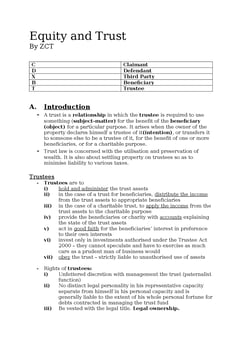Lysaght v Edwards [1876] 2 Ch D 499
Judgement for the case Lysaght v Edwards
Table Of Contents
KEY POINTS
Real estate transactions often involve contracts between vendors and purchasers. These agreements establish the terms and conditions for the sale of real property.
However, complications may arise, especially in cases where the vendor passes away before the completion of the transaction. This situation can trigger questions related to the general devise of real estate upon trust for sale and the devise of trust estates.
In real estate, the terms of contracts between vendors and purchasers set the stage for property transfers. Nevertheless, when a vendor dies before the completion of a transaction, issues surrounding the general devise of real estate placed in trust for sale and the disposition of trust estates may come into play.
FACTS
The case involves a settled estate, which is a type of property ownership arrangement often used for estate planning purposes. In a settled estate, the legal ownership and beneficial interest in the property are typically divided, with one party holding legal title and another party having a beneficial interest.
The case refers to the Leases and Sales of Settled Estates Act, 1856, which contains provisions relevant to the case including the powers and limitations of the court in dealing with settled estates.
There was a legal dispute between the parties involved in the settlement, the settlor (the person who established the trust) and the beneficiaries (those with a beneficial interest in the estate), regarding ownership of the estate.
The court held that it was determined that the real estate intended to be acquired by the Plaintiffs indeed passed to H. as per the provisions outlined in the device of trust estates. Held that specific performance was available to the purchaser, who should be considered a constructive trustee.
COMMENTARY
Real estate transactions often involve contracts between vendors and purchasers, which outline the terms and conditions for property sales. However, complications can arise when a vendor passes away before the completion of the transaction. In such cases, legal questions may emerge concerning the general devise of real estate upon trust for sale and the handling of trust estates.
-
In the context of a specific case from 1874, the Plaintiffs had entered into a contract to purchase real estate. Unfortunately, the vendor passed away after the title was accepted but before the transaction could be finalized.
His will, executed in 1873, stipulated that his estate was bequeathed to E., whom he appointed as executor.
The will also included provisions for the real estate, directing that it be devised to H. and M. with the intention that they would hold it in trust for sale.
Moreover, the will specified that any real estate vested in H. upon the vendor's death as a trustee would be solely owned by H.
In the judgment, the court determined that the real estate that the Plaintiffs had contracted to purchase indeed passed to H., following the provisions of the devise of trust estates. Specific performance was available to the purchaser who should be considered a constructive trustee.
This case underscores the importance of understanding the legal mechanisms in real estate transactions, especially when unexpected events, such as the death of a party, occur.
ORIGINAL ANALYSIS
Lysaght purchased land from Edwards. Edwards died before the transaction was final.
His heirs denied that the transaction should take place. The purchaser brought an action forward for specific performance of the contract.
Held that specific performance was available to the purchaser.
CA held that once you have a valid contract for sale that the vendor becomes in equity a constructive trustee for the purchaser of the estate sold, and the beneficial ownership passes to the purchaser, the vendor having right to the purchase-money, a charge or lien on the estate for the security of that money and a right to retain until it is paid.
For Further Study on Lysaght v Edwards
Need instant answers? Our AI exam tutor is here to help.
Ask questions 🙋 Get answers 📔 It's simple 👁️👄👁️
Our AI is educated by the highest scoring students across all subjects and schools. Join hundreds of your peers today.
Get StartedSimilar Cases
Related Product Samples
These product samples contain the same concepts we cover in this case.

 Since 2010, Oxbridge Notes has been a trusted education marketplace, supplying high-quality materials from top achievers at universities like Oxford, Cambridge, LSE, Harvard, and Yale.
Since 2010, Oxbridge Notes has been a trusted education marketplace, supplying high-quality materials from top achievers at universities like Oxford, Cambridge, LSE, Harvard, and Yale.